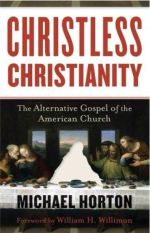Tag: evangelicalism
 Here we are in the North American church—conservative or liberal, evangelical or mainline, Protestant or Catholic, emergent or otherwise—cranking along just fine, thank you. So we’re busy downsizing, becoming culturally relevant, reaching out, drawing in, making disciples, managing the machinery, utilizing biblical principles, celebrating recovery, user-friendly, techno savvy, finding the purposeful life, practicing peace with justice, utilizing spiritual disciplines, growing in self-esteem, reinventing ourselves as effective ecclesiastical entrepreneurs, and, in general, feeling ever so much better about our achievements.
Here we are in the North American church—conservative or liberal, evangelical or mainline, Protestant or Catholic, emergent or otherwise—cranking along just fine, thank you. So we’re busy downsizing, becoming culturally relevant, reaching out, drawing in, making disciples, managing the machinery, utilizing biblical principles, celebrating recovery, user-friendly, techno savvy, finding the purposeful life, practicing peace with justice, utilizing spiritual disciplines, growing in self-esteem, reinventing ourselves as effective ecclesiastical entrepreneurs, and, in general, feeling ever so much better about our achievements.
Notice anything missing in this pretty picture? Jesus Christ!
This has to be one of the best introductions to a sermon I’ve heard. At only seven minutes long, John Piper hits the nail right on the head concerning the state of evangelicalism. Very excellent analysis, yet very saddening. The truth is hard to hear sometimes, but we must properly and truthfully identify the problems in order to administer an adequate remedy. This is an audio excerpt from the sermon My Anguish, My Kinsmen Are Accursed, pertaining to Romans 9:1-5.
 As Carl Trueman on Reformation21.org and Al Mohler on almohler.com have pointed out recently, something is so fascinating with the recent wave of criticism by the left of Obama asking Rick Warren to perform the invocation at his inauguration (which I must give Obama credit on being a consistent relativist as opposed to others on the far-left): no matter how friendly, or nice, or palatable or seeker-friendly you make your message concerning what Scripture says about God’s Law or the Gospel itself, those who are unbelieving and God-hating, those who are adamantly opposed to what is said still view you as a crazy, fanatical nut.
As Carl Trueman on Reformation21.org and Al Mohler on almohler.com have pointed out recently, something is so fascinating with the recent wave of criticism by the left of Obama asking Rick Warren to perform the invocation at his inauguration (which I must give Obama credit on being a consistent relativist as opposed to others on the far-left): no matter how friendly, or nice, or palatable or seeker-friendly you make your message concerning what Scripture says about God’s Law or the Gospel itself, those who are unbelieving and God-hating, those who are adamantly opposed to what is said still view you as a crazy, fanatical nut.
Warren even goes so far as to be a middle-of-the-road kind of guy politically speaking, I’m guessing with the hope with bridging a cultural divide. Yet it seems to not matter to those who hate Scripture. Now Obama is receiving a backlash of criticism from the far-left gay rights community for asking Warren to do the prayer, as well as those who simply believe in the normalcy of homosexuality, because Warren believes it to be sin according to Scripture. And in doing so, they believe Warren to be a “fundeemeentaleest,” even though he has gone to great lengths to make his message more acceptable to a hostile, post-Christian (quickly becoming anti-Christian) culture.
(Original): http://www.challies.com/archives/articl … ting-a.php
(Archived): http://www.westerfunk.net/archives/chri … en%20Life/
 A friend of mine posted this link under an item I posted recently on Facebook and so I thought it was pertinent to read in itself. It seems secular marketers have moved more and more into the Christian publishing market, and as a result, we are receiving what we “want” to read based on statistical analysis, not necessarily what we need to be reading as believers. We need to take it back for the glory of God, not the glory of profit. www.monergismbooks.com is a great place to start.
A friend of mine posted this link under an item I posted recently on Facebook and so I thought it was pertinent to read in itself. It seems secular marketers have moved more and more into the Christian publishing market, and as a result, we are receiving what we “want” to read based on statistical analysis, not necessarily what we need to be reading as believers. We need to take it back for the glory of God, not the glory of profit. www.monergismbooks.com is a great place to start.
It’s not wrong to make money off of a venture in the Christian publishing industry. However, is that the driving motivation for your business? Or is it getting good literature into people’s hands so they will grow in the faith? Pyromarketing techniques in evangelicalism are watering down the Gospel to where there is really no Gospel left at all that resembles anything of what the Scriptures say, or at the very least a three deep reiteration.
I would also like to add as a disclaimer that I do not believe Warren’s book has done no good at all, because it is very likely some people read it who never would have read anything even remotely Christian who then later had a better explanation of the Gospel than Warren’s at their local church (hopefully). So we have no idea what individuals may have been affected. To presume to know so is nonsense.
Now I would also say, along with Paul Washer, that those who say, “But I was saved through that method,” that you weren’t saved through it but probably in spite of it, because many of these methods have so butchered and skewed the Gospel that is beyond recognition of what the Scriptures actually say.
Regardless, this article exposes an area in our Christian culture that possesses an increasingly worldly modus operandi that really is anything but Christian if the Christian publishing companies are all about profit instead of growing people in Christ.
“For I bear them witness that they have a zeal for God, but not according to knowledge.” – Romans 10:2
 These words were spoken by Paul testifying to the Jews zeal for God, His ways, His acts, His words. Yet their zeal for God, as he says, was not according to knowledge. The whole discourse of Romans chapters nine through eleven is dealing with the unbelief of the Jews as a whole and how it is God’s promises to them still stand in light of the fact that a majority of the nation of Israel rejected the Messiah, Jesus. Paul’s undeniable response as to why God’s promises still stand is that not all physical Israel (Israelistes) is spiritual Israel (all of God’s people for all time), but rather His promise stands according to election, that is, His choice, not ours, in who He wants to save through granting faith.
These words were spoken by Paul testifying to the Jews zeal for God, His ways, His acts, His words. Yet their zeal for God, as he says, was not according to knowledge. The whole discourse of Romans chapters nine through eleven is dealing with the unbelief of the Jews as a whole and how it is God’s promises to them still stand in light of the fact that a majority of the nation of Israel rejected the Messiah, Jesus. Paul’s undeniable response as to why God’s promises still stand is that not all physical Israel (Israelistes) is spiritual Israel (all of God’s people for all time), but rather His promise stands according to election, that is, His choice, not ours, in who He wants to save through granting faith.
Reflecting on this verse in particular though made me think not so much in terms of the Jews as a whole though, but rather my own heart (the first place we should start in applying the Scriptures) and its daily tendencies toward unbelief, and in our own day, specifically within evangelicalism at large within America. There are many people in our culture who claim to be Protestant Christians, who claim the title born again, claiming to be regenerated by the power of God from death to life, and yet their lives are totally out of sync with that confession, living as if they had never been born of God’s Spirit. There is no outward evidence pointing to the inward, supernatural reality that the Holy Spirit has indwelt their hearts. This verse makes me think about this a lot. How many of us in our Evangelical Christian Culture have a zeal for God, just as the unbelieving Jews did, yet a zeal not according to knowledge, that is, a zeal for God outside of the Gospel? No one can definitively know of course, for only God sees the belief or unbelief of the heart. Yet there are clear indications in Scripture (James, 1 John) that point in one direction or the other.
Surely, there are many many people nowadays who have a zeal for God, for His ways (as long as they are the positive attributes), His acts (the same), and so on. Yet based upon Paul’s assessment of his own kinsmen in this verse, it is probable many even in our own time possess this zeal for God outside of the Gospel, which ultimately leads to eternal punishment, because if you have a zeal for God outside of Christ, ultimately, your salvation is based on works and not on faith alone. It is not enough to simply have a zeal for God outside of trusting Christ’s work on your behalf. You need to be saved from the core of your being outward, by His power and Spirit. You need God-produced faith in you that sees and trusts Jesus as Savior, not merely a zeal for Him that pursues Him on your own efforts and works.
This was the error of the Jews in Paul’s day: they had rejected the Messiah and setup their own righteousness as what made them acceptable in God’s eyes. Sure, they had a zeal, desire, and even head-knowledge of God. Yet as Paul says, it was not according to knowledge and they found themselves outside of the grace of God, under the wrath of God, even at that moment (John 3:36). What kind of knowledge do we need though? Divinely granted knowledge revealed in Scripture, for how else can we know God unless He opens our minds, hearts, wills, and souls to see and receive Him (John 3:1-10)? We need God’s divine knowledge of the Gospel and we need Him to work in our hearts so that we love and trust Him in truth, in Gospel-knowledge.
What is so saddening about the unbelief of the Jews Paul seeks to explain in Romans nine through eleven is the way he prefaces this whole section in Romans 9:1-5:
I am speaking the truth in Christ—I am not lying; my conscience bears me witness in the Holy Spirit— that I have great sorrow and unceasing anguish in my heart. For I could wish that I myself were accursed and cut off from Christ for the sake of my brothers, my kinsmen according to the flesh. They are Israelites, and to them belong the adoption, the glory, the covenants, the giving of the law, the worship, and the promises. To them belong the patriarchs, and from their race, according to the flesh, is the Christ who is God over all, blessed forever. Amen.
Just consider for a moment all of the vast privileges the Jews had. Yet Paul is lamenting their unbelief! To them belong the adoption, the glory, the covenants, the law, the worship, the promises, and ultimately from them came Jesus Himself. What an honor and privilege! And oh how sad it is, they are outside the grace of God, because God has now spoken to us by His Son (Hebrews 1:1-4). To reject Him is to reject God and be forever under His just wrath.
Consider today for a moment all of the vast privileges we have in this nation: freedom of expression, the unfettered ability to preach the Gospel, the mass media, a (relatively, compared to other nations) stable economic environment, the freedom to meet together on Sunday’s to worship. And yet I fear the same thing for many people here Paul did for his brothers, the Israelites: there seems to be a zeal for God that is not according to knowledge on a mass scale in evangelicalism. I turn on the television and see preachers say nothing of the core content of the Gospel, even the basics, just simply that “God loves you.” That is not the Gospel, it is a half-truth at best, which as J.I. Packer says becomes a complete untruth. I hear radio sermons that mention nothing of Christ’s blood sacrifice on behalf of sinners. I see church websites that offer nothing of what they actually believe concerning Christ and His work, who go under the label evangelical. I’m not talking about doctrinal precision, I’m talking about Gospel precision, where is it? For many preachers, teachers and lay people, “God loves you” is all they need to hear, without all the fuss of sin and justice talk. Yet this is not a message according to knowledge, divine Gospel-knowledge. It is a message that Satan seeks to use by watering down and mute the Biblical Gospel with all of its hard edges. And how pervasive this message seems to have become.
My fear for people in our churches today is that many adhere to Christianity for cultural reasons, not personal salvific reasons, identifying with a group for its own sake instead of running to Christ alone for salvation. If this is possible with the Israelites who had way more advantages than we have (the natural branches, as Paul referred to them), how great of a possibility is it for us (the ingrafted branches) to fall into the same unbelief, all the while supposing we are all saved, merely because of a shallow message, “God loves you”?
My prayer and hope is that God will cause a revival in the church in America, not just of emotions, but a revival of Gospel-truth, passion for God’s infallible Word, a passion for doctrinal truth, all of which will inevitably result in a revival of heart-felt affections for Him and seeing others enter into the Kingdom through Christ alone. May God be merciful to us. May He be merciful and turn my own heart from unbelief in His promises, for I know how easily I can go astray myself.
 In one sense, as believers in Christ, we are to be accepting and loving toward those who do not know Christ. Yet we also have doctrinal convictions and beliefs that counter those who differ with us and we are to oppose them (lovingly of course). Jesus put it like this: “Behold, I am sending you out as sheep in the midst of wolves, so be wise as serpents and innocent as doves” (Matthew 10:16). We are to go out preaching the Gospel in its full array of hard truths (original sin, total depravity, just wrath, hell, substitutionary atonement, justification through faith alone in Christ alone, all of which is made possible by grace alone) and yet we are to be innocent as doves in our speech and conduct toward them. We are not to be deceived by false teaching and even more so, we are to oppose it, but do so with reverence, gentleness, and respect (1 Peter 3:15).
In one sense, as believers in Christ, we are to be accepting and loving toward those who do not know Christ. Yet we also have doctrinal convictions and beliefs that counter those who differ with us and we are to oppose them (lovingly of course). Jesus put it like this: “Behold, I am sending you out as sheep in the midst of wolves, so be wise as serpents and innocent as doves” (Matthew 10:16). We are to go out preaching the Gospel in its full array of hard truths (original sin, total depravity, just wrath, hell, substitutionary atonement, justification through faith alone in Christ alone, all of which is made possible by grace alone) and yet we are to be innocent as doves in our speech and conduct toward them. We are not to be deceived by false teaching and even more so, we are to oppose it, but do so with reverence, gentleness, and respect (1 Peter 3:15).
However, in our modern day in age, the Protestant evangelical church, to a large degree, has capitulated to the culture, inviting in its pagan practices and belief systems, as orthodox teaching even. What do I mean? Well, let’s consider the millions of “FW: Fw: Fw:” emails circulating the globe right now, sent by those from within Protestant evangelical churches. Most of these entail some form of superstition or myth, that if you do X then Y will happen, without any regard for a sovereign God who rules all things by His powerful word. In addition, many of these emails are already documented as being false out on www.snopes.com (check it out).
But regardless, the principle is that something can be said about what is being taught (or not being taught) nowadays in our churches concerning who God is and how He has acted in history through Christ to redeem us from God’s impending wrath. Something can be said about the teaching because it has resulted in “believers” folding to these mystical “Christian” emails, believing them to be true. I can’t tell you how many of these my dad receives from people within his own evangelical Bible study group. I had to just ask people to quit sending them to me, or in most cases I would find the snopes.com article speaking about that particular email and reply to all with the link. They stopped coming in quickly. I mean it’s not true, right? Why should things that aren’t true spread around as if they were? But that is not my main point.
Something else concerned me today that prompted me to write this entry. I noticed a Facebook group entitled, “100,000,000 Christians Worship God!” And while I certainly hope that is true (while remaining cautious as to the truthfulness of that), something confirmed my cautiousness. I noticed many of the comments on the forums saying things along the lines of, “Are we Baptists, Methodists, Catholics, etc. or are We CHRISTIANS? Too many times we get all worked up in denominations, that we forget we are all brothers and sisters in Christ, we are Christians indeed. Why do we continue to put down one another, we all have our faults in the denomination.” Yes the church is imperfect. Yes the church has rough edges, in every denomination. Yes, even Reformed denominations and circles for sure. :] But is there not a good reason, in many cases (though not all), for denominational splits?
A quote from Monergism.com’s Bad Theology section says this: “Divisions and separations are most objectionable in religion. They weaken the cause of true (Gospel) Christianity…But before we blame people for them, we must be careful that we lay the blame where it is deserved. False doctrine and heresy are even worse than schism. If people separate themselves from teaching that is positively false and unscriptural, they ought to be praised rather than reproved. In such cases separation is a virtue and not a sin.” Yet this is lost nowadays on our Christian culture at large.
This is where the evangelical church has capitulated to the pagan culture around us and its ideas. How? Instead of holding fast to the Christian understanding of tolerance, to a large degree, we have adopted their understanding of tolerance. This was set in stone for me on the group itself where it gave rules for the members: “If you or anyone is known to say or write anything unkind or negative to anyone in our group we will ban them IMMEDIATELY upon notification.” Now of course, the rule should stand in the instances where people say unkind and things to others, so as to harm them personally. That should not be tolerated. And of course, trying to manage that for 400,000+ users is next to impossible. However, that’s not my point. It was the addition of something in the rule that I think is revealing. Did you see it? “Anything … negative.” Anything? Really? Even doctrinal disagreements that hit at the root of how people are saved and get into heaven for eternity? Hmm. Is this not the adoption of something that our secular culture values, that is moral and religious relativism?
During the 16th century, there was this little theological schism in the catholic (universal) church called the Reformation. Heresy was the issue at hand, heresy having to do with how people are saved, literally, for eternity. And while I personally desire for all to be saved and to come to a knowledge of the truth, the uproar in the Reformation was over this very issue: how are people to be saved from God’s wrath? Catholics and Protestants fundamentally disagree over how people are saved. Luther was condemned as a heretic at the Diet of Worms. I hold to Luther’s teachings on the Gospel. To Protestants he should be considered one for whom the world was not worthy for standing strong against false teaching and upholding the Gospel. We do have affirmations together with Roman Catholics on the Trinity, the two natures of Christ, and several other important distinctions that can be made over against other religions (like the Mormons, JW’s, and others who would claim to be under the title of Christianity). But are these enough to unite us? No. They go further to talk about certain, extra-scriptural requirements placed upon the work of Christ, if we are to be saved.
We drastically differ on the nature of salvation itself with the Roman Catholics. This is not an unimportant distinction as most seem to think. This is not something we can just look over. This affects our ability to stand together as one people in Christ with Roman Catholics because we both view each other as heretics (heretics being those who believe doctrines that will take them to hell). Yet it seems those who claim to be Protestant evangelical Christians don’t get this at all, which just makes you have to really wonder about their own understanding of the Gospel to begin with (justification by grace alone through faith alone in Christ alone), though of course you cannot necessarily paint everyone with a broad brush, I know.
Regardless, it seemed a majority of people in the group forums were making many of the same statements (though I only read a handful of the thousands of comments) concerning our unity with Roman Catholics in particular, as well as other denominations, that by Biblical, historical, Gospel, confessional standards, are anathema (accursed), enemies of God, enemies of the cross, because they reject the Gospel message itself in their teaching and preaching, either implicitly or explicitly. “They have a form of godliness while denying its power” (2 Timothy 3:5). Some of the few comments I actually appreciated were those coming from some Roman Catholics opposing the Protestants for trying to bring about this unity. I found this interesting, because the argument by the Roman Catholics was that we Protestants have abandoned the “real” church (Rome) and have no right to call together unity. I agree, not that we have abandoned the real church, but that we have no right to call together unity.
We Protestants, as a group, deny their doctrines that only the Roman Catholic Church can interpret Scripture for us, that she is infallible. We believe in Sola Scripura, that the Scriptures alone are the sole, final, infallible authority for the life and practice of the church. We deny their Eucharist because in it is a most pernicious belief that Christ is re-sacrificed each week at Mass. We deny that Christ’s atonement is incomplete and that only the priests can stand in between us and the Savior. This flies in the face of Hebrews 10:11-13 which reveals that Roman Catholics have simply re-instituted the Jewish sacrificial system all over again each week in their Mass, but instead now, the sacrifice is the “incomplete” work of Christ, at least according to them. And as far as the priests are concerned in the Church of Rome, Christ alone, not a sinful priest, is our intercessor. No man can stand in between us and God. The only One who can, who is qualified, is Christ Himself. The way has been opened, the temple curtain torn in two by His work on the cross. He is our great High Priest. Through the work of Christ alone, we have full, unfettered access to the throne of God above, when outside of it, only wrath and a fury of fire remains.
Surprisingly, even the Roman Catholics (at least those true to the Roman Church) are getting the point in the forums, the very point I’m trying to make: there is and can be no unity between Catholics and Protestants on the basis of the fact that we both have serious doctrinal disagreements on the nature of salvation itself! They see the real issue at hand here: eternity, either with or without God. Maybe we should wakeup too and recover the Gospel in our groups before it is lost amongst our denominations altogether.
All of this in turn makes me consider whether there are 100,000,000 Christians (saved, regenerate, actually believing, Christians) worshipping God right now (through faith alone in Christ alone, the only way to truly worship God to begin with, is it not? (Romans 14:23) if these people claiming to be Christians believe there are other acceptable views within Christianity of how we are saved; and, if they believe there to be no important disagreement on fundamental soteriological (salvation) issues. Yes yes, I cannot know anyone’s heart. I agree with you. No one, not even the person, can really know the heart, but only God knows. Here’s a distinction though: you can know what someone believes (at least outwardly, at face value) by what they state personally as their beliefs, can you not? Is that not what doctrine is, a stated belief in words, sentences, you know, language, that we use to communicate ideas and concepts to others? This seems to be lost now though in our mystical, culturally inclusive, relativistic Christian culture.
Yes, I wish the church could be universal in the sense that there were no denominational splits. But unfortunately, we do not have that luxury, because within many of these different denominations are false doctrines and heresies by which people are being blinded from the very Gospel itself and led straight to hell. That seems to me to be quite important, trumping this postmodern, cultural desire for what really amounts to false unity to begin with. This is frightening and should strike fear in us as believers that we be faithful to the Apostolic Gospel message delivered to us in the Scriptures.
I cannot stand in worship with Catholics or other (theologically liberal or relativistic) denominations even who deny we are saved by grace alone through faith alone in Christ alone. I will not. Because I’m theologically arrogant? Not at all. I’m a sinner saved by grace alone. How could I possibly be arrogant if God is the One who saved me when I wanted nothing of Him, blind and depraved, turned away from Him? I cannot. This has everything to do though with the very Gospel itself by which we are saved. We lose that, then what is the point of the church? I will not stand with those who differ on these points because we believe we are saved in two entirely different ways. One is supernatural, the other is fleshly. One is by divine intervention, the other we climb the latter of works to be acceptable. One is by Grace Alone through the finished work of Christ; the other is faith plus works you do to get in good with God (which is just smoke and mirrors for humanistic, man-accomplished salvation really).
Within many denominational splits lies important theological (belief) distinctions that must be understood. If someone says this is unimportant, they have clearly adopted the modern pagan postmodern cultural understanding that doctrines and creeds should be eradicated because, “We can’t really know anything for sure can we?” This is sad, mainly because church history is full of people who died, were tortured, let their families be split apart, all for theological distinctions and doctrine even, because they knew the glory of Christ was at stake. Would those early church doctors and fathers who have gone on to be with the Lord before us say the doctrines for which they willingly perished were unimportant? I think not.

